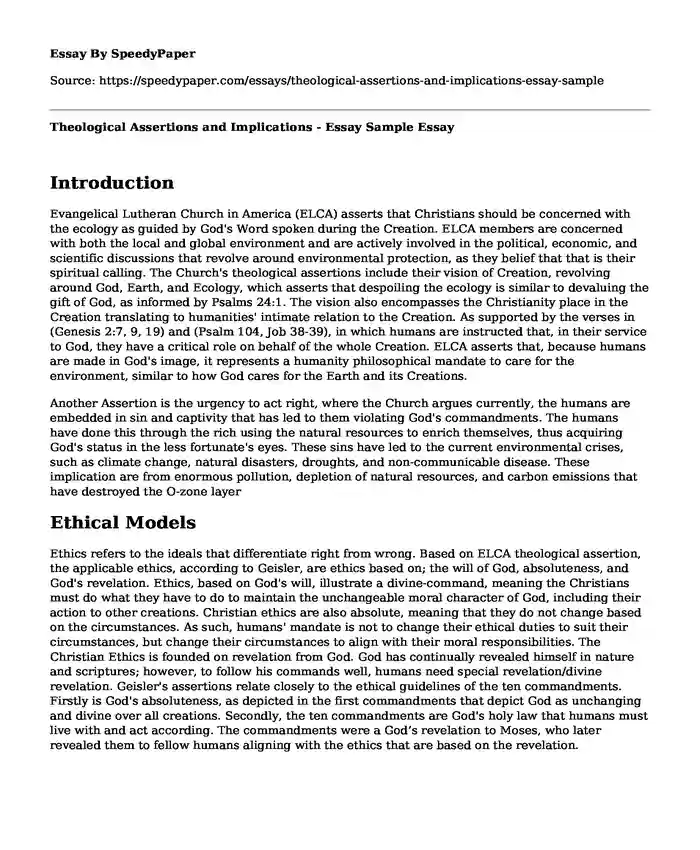
| Type of paper: | Essay |
| Categories: | United States Christianity Church |
| Pages: | 3 |
| Wordcount: | 666 words |
Introduction
Evangelical Lutheran Church in America (ELCA) asserts that Christians should be concerned with the ecology as guided by God's Word spoken during the Creation. ELCA members are concerned with both the local and global environment and are actively involved in the political, economic, and scientific discussions that revolve around environmental protection, as they belief that that is their spiritual calling. The Church's theological assertions include their vision of Creation, revolving around God, Earth, and Ecology, which asserts that despoiling the ecology is similar to devaluing the gift of God, as informed by Psalms 24:1. The vision also encompasses the Christianity place in the Creation translating to humanities' intimate relation to the Creation. As supported by the verses in (Genesis 2:7, 9, 19) and (Psalm 104, Job 38-39), in which humans are instructed that, in their service to God, they have a critical role on behalf of the whole Creation. ELCA asserts that, because humans are made in God's image, it represents a humanity philosophical mandate to care for the environment, similar to how God cares for the Earth and its Creations.
Another Assertion is the urgency to act right, where the Church argues currently, the humans are embedded in sin and captivity that has led to them violating God's commandments. The humans have done this through the rich using the natural resources to enrich themselves, thus acquiring God's status in the less fortunate's eyes. These sins have led to the current environmental crises, such as climate change, natural disasters, droughts, and non-communicable disease. These implication are from enormous pollution, depletion of natural resources, and carbon emissions that have destroyed the O-zone layer
Ethical Models
Ethics refers to the ideals that differentiate right from wrong. Based on ELCA theological assertion, the applicable ethics, according to Geisler, are ethics based on; the will of God, absoluteness, and God's revelation. Ethics, based on God's will, illustrate a divine-command, meaning the Christians must do what they have to do to maintain the unchangeable moral character of God, including their action to other creations. Christian ethics are also absolute, meaning that they do not change based on the circumstances. As such, humans' mandate is not to change their ethical duties to suit their circumstances, but change their circumstances to align with their moral responsibilities. The Christian Ethics is founded on revelation from God. God has continually revealed himself in nature and scriptures; however, to follow his commands well, humans need special revelation/divine revelation. Geisler's assertions relate closely to the ethical guidelines of the ten commandments. Firstly is God's absoluteness, as depicted in the first commandments that depict God as unchanging and divine over all creations. Secondly, the ten commandments are God's holy law that humans must live with and act according. The commandments were a God’s revelation to Moses, who later revealed them to fellow humans aligning with the ethics that are based on the revelation.
Stefon’s Publication
Chapter nine of Stefon's publication illustrates how the Christians should relate to the world, thus aligning with ELCA assertion and their ethical duties towards nature and its creations. ELCA asserts that it is the duty of Christians to be involved in politics and economic discussions that revolve around environmental protection. Stefon's document further illustrates this aspect by showing how the Church institution should relate to the State, particularly the political order. The relations are explained by elaborate examples of how the Church has participated in democracies, monarchies, and communism.
Conclusion
Thus, the document illustrates the role of the Church and society, which asserts that faith-based movements always influence society's character. For example, the Church's action towards the environment will influence how the community cares about the environment. Further, the assertion also means that Christian ethics will also inform the morality of society.
Works Cited
Evangelical Lutheran Church in America (ELCA). Caring for Creation: Vision, Hope, and Justice, n.d.
Geisler, Norman L. Christian Ethics: Contemporary issues and options. Baker Academic, 2010.
Stefon, Matt, ed. Christianity: History, belief, and practice. Britannica Educational Publishing, 2011.
Cite this page
Theological Assertions and Implications - Essay Sample. (2024, Jan 01). Retrieved from https://speedypaper.net/essays/theological-assertions-and-implications-essay-sample
Request Removal
If you are the original author of this essay and no longer wish to have it published on the SpeedyPaper website, please click below to request its removal:
- Free Essay on The Disuniting of America by Arthur Schlesinger
- Essay Example on the Role of the Federal Reserve
- Crime Research
- Paper Example. The Letter to the Director of National Intelligence
- Argumentative Essay on God's Existence
- US Military Talent Management: Systematic Investment for Optimal Performance - Essay Sample
- Influence on U.S. Government - Essay Sample
Popular categories




